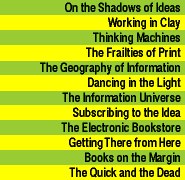


Books on the Margin
If future publishers charge roughly as much as it costs to copy a book they won't have serious losses from piracy. It would probably even be reasonable to charge, say, five times the copying costs, since they would be the most convenient---and legal---suppliers. But prices over, say, ten times the cost of copying may lead to a good deal of piracy, and the potential pirates aren't just a few villains twirling their mustaches in dark electronic corridors of the international computer network. They are also millions of people sharing favorite books and magazines with friends.In an ideal world, then, each electronic book copy should cost between fifty cents and a dollar. That sounds crazy when we look at today's five-dollar paperbacks and twenty-five-dollar hardbacks. But let's do the arithmetic.
Suppose that a company publishes only two hundred titles and that each title finds only three thousand readers; the publisher then has six hundred thousand readers in total. Imagine that only one in ten of these are serious readers and wish to subscribe. At ten dollars a month for the subscription (that is, for the subscriber's right to pay one dollar each for each copy of any book they want), the publisher would gross over seven million dollars a year.
That's not counting income from the seemingly paltry one-dollar-a-copy charge. If the average subscriber only buys five books a year, that alone comes to more than a quarter million extra. Even if subscription halves in a year, the publisher will still gross over three million that year. Further, sizable chunks of today's costs for capital, warehousing, transportation, and so on would be replaced by far smaller electronic costs. So the net profit should be higher---and the net risk lower. All that with only two hundred low-demand titles.
Of course, this calculation will only be good for the next five years or so. Once many large publishers are offering such services, there will be more subscription services than the tiny reading market can bear. So eventually, perhaps over the next ten to fifteen years, publishers might become the equivalent of common carriers, and a new branch of specialized publishing might offer subscription services in specific areas---hunting, computing, movie books, and so on---by pooling small parts of the lists of several publishers.
When books are electronic, the marginal cost to distribute a copy of any title will be near zero. So it will be irrelevant that some titles aren't big sellers---they cost nothing to keep, they can be stored forever, and they cost almost nothing to distribute if demand ever rises. These economics will shift the publishing company's interest from single titles to its entire list, for each title will be valuable if it eventually gains the publisher more subscribers. Even snob appeal books that no one ever reads will be useful if they add luster to the list and so attract subscribers. Publishers could support more authors and a wider variety of specialty topics, and there could be more books. They could always be up to date and bigger, cheaper, and easier to get and use than present-day books. And they could always be in print.
The returns from expanding the number of distribution sites is even more dramatically nonlinear than increasing a book's print run today. Each distribution site could be simply a telephone line and a small special purpose computer---a few thousand dollars of equipment that would easily pay for itself even if it only supported a few dozen new subscribers. Under these circumstances, anyone could be a publisher. A few thousand dollars worth of computer equipment could translate into millions of dollars in subscriptions. Rents too could be low as distribution sites needn't be in Manhattan or London. As no employees are necessary, Nome or the Outer Hebrides would do just as well.
More numerous publishers would increase title diversity, leaving the market alone to decide which ones are good. Today, because we commit everything to paper, the few can control what the many can read by controlling the bottleneck---the printing process. This is about as sensible as letting Kodak control the movie industry because it produces the most film.
Further, electronic publishers could be international without having to staff and support overseas bases. Electronic information, unlike paper books, is easy and cheap to transport, so distance doesn't matter. Geography, at least on planet earth, will be nearly irrelevant in the information universe.
At that point, our sluggard governments will start worrying about export controls and tariffs---but they too will be irrelevant, because unenforceable. The state can no longer control its population by restricting access. Cutting off international calls, for example, would have drastic economic, social, and political consequences. And even if a state were to disallow international calls, there would still be satellites and radio. That's as true of Russia, Singapore, and China as it is of America, Canada, and Britain.